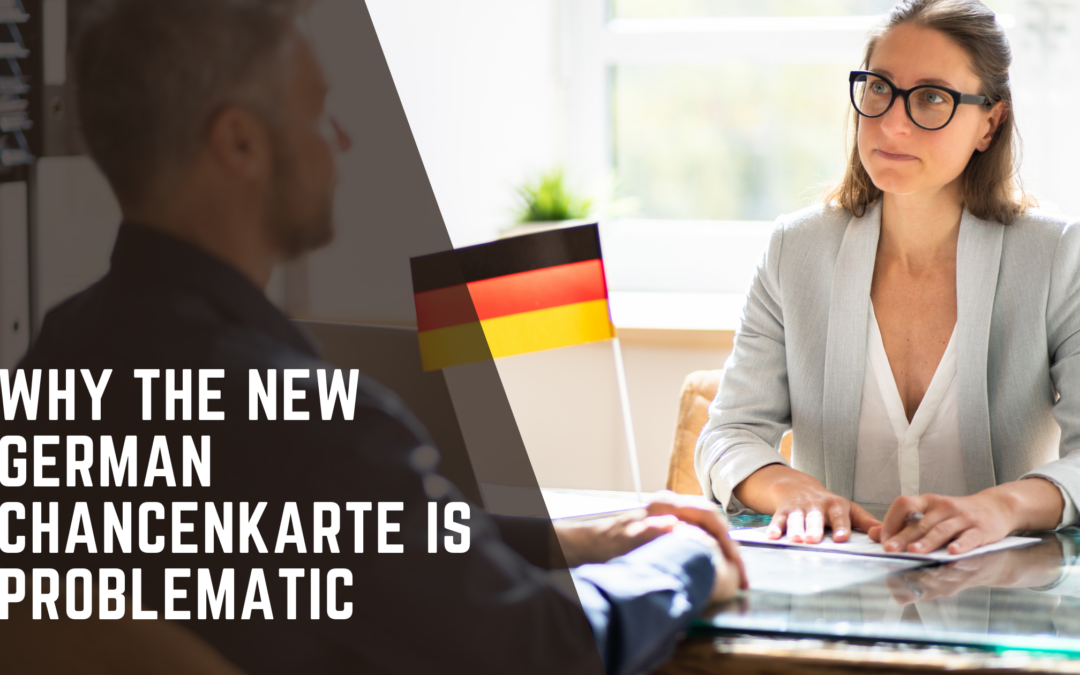WHY THE NEW GERMAN CHANCENKARTE IS PROBLEMATIC
Germany is slowly changing for the better and the government is taking more concrete actions to make immigration to the country much easier than it was previously. Change is urgently needed if the country wants to attract skilled workers, especially with an ever-worsening worker shortage problem at hand.
Not only are they moving to make getting German citizenship easier, they are planning to amend existing laws to allow people to hold dual citizenship as well. Citizenship will go a long way to improve your life in Germany as you’ll be eligible to vote, have freedom of movement in the labor market, and so much more.
Join Our Community
Stay ahead with the latest news on immigration developments, employment opportunities, and other updates about life in Germany. Get valuable insights, early access to Berlin Life guides, invites to community events, and more. Don’t miss out – subscribe to one of the most popular newsletters in Berlin.

THE NEW GERMAN CHANCENKARTE
Another new development is that Germany plans to copy America’s and Canada’s point-based immigration system, with the release of the Chancenkarte or the “opportunity card”. If you meet three out of four criteria of the Chancenkarte, you can move to Germany for a set time, even without having a job.
The idea behind the opportunity card is to make moving to Germany for work more straightforward for skilled workers from non-EU countries, especially useful in alleviating critical labor shortages in certain areas.
Here’s what we know about the opportunity card so far:
1) The German government will set an annual quota based on need. There would be a set number of spots available, allowing certain skilled workers to come to Germany to look for a job, or even take further education or training in their set profession.
2) While unemployed, you’d need to have the financial means to support yourself, including your own health insurance. You won’t be eligible for any state benefits until you’ve lived and worked in Germany for a set period of time.
3) Those who apply for the opportunity card will have to meet three out of four criteria:
- A recognized degree or professional qualification
- Three years of related professional experience
- German language proficiency or prior residence in Germany (The exact level of German language proficiency hasn’t yet been specified)
- 35 years old or younger
4) All criteria will be equally weighed.
5) Constraints will be set each year that limits who can apply for the card, with industries most in need getting priority. This means that a profession that is in demand for one year may not be included the following year, meaning you won’t always be able to count on the availability of this particular visa option.
6) The length of the opportunity hasn’t been determined either, such as the job seeker visa which limits the time in Germany to six months.
THE GERMAN CHANCENKARTE ISN’T OFFICIAL YET
The opportunity card concept is still in development but in good news, on November 30, 2022, it was approved! The next step is to formulate a bill and pass it through the Bundestag and Bundesrat. As with most things in Germany, big changes like this take a looooong time to happen, so don’t count on the opportunity card being formalized anytime soon, especially while the government’s dealing with a number of other unprecedented crises.
Even then, don’t expect it to come into effect exactly as described above, as the various parties will need to weigh in on the matter and not all parties are pro-immigration. The CDU/CS, as well as the FDP, have been pushing back on a lot of the proposed reforms. In addition, the proposal needs more refinement to be able to make a tangible impact on improving the skilled worker shortage (even the officials think so). As such, it’s expected that the Chancenkarte won’t be available until the end of 2023 – at the earliest.
Recommended reading: How To Save Energy In Germany This Winter
While waiting for the Chancenkarte to pass, there are still plenty of other visa options available for those seeking to move to Germany for work, such as the working holiday visa, regular work permit, blue card, job seeker visa, freelancing visa, and more.
THE PROBLEMS WITH THE GERMAN OPPORTUNITY CARD
Many are rightfully critical of the German Chancenkarte as there numerous issues.
1) There Is Too Much Emphasis On Degrees And Certifications
It prioritizes those with education. If you don’t have a degree or relevant professional qualifications, it counts against you when applying for this visa. There are many people out there who have all the right experience and are just as good as someone with a formal degree, yet they could be excluded from this visa if they don’t meet the other three criteria.
Aside from this, getting your degree and other qualifications recognized in Germany is a highly bureaucratic process that can take up to three months to complete. This factor alone keeps the Chancenkarte from being a visa that’s quick and easy to get. They’ve vaguely promised to streamline this process, but no details have emerged to yet substantiate this claim.
Just because you apply to have your qualifications recognized, doesn’t guarantee it will be approved. Failing to get the required recognition will be a factor that counts against visa applicants.
Recommended reading: Getting your foreign qualifications recognized and getting your academic qualifications recognized.
2) The Opportunity Card Is Ageist
Apparently, life ends after age 35 in the eyes of the German government. This blatant ageism is one of the biggest problems of the German Chancenkarte.
Wanting to attract younger talent is understandable with an aging population, but excluding people over 35 feels short-sighted, as more experienced and knowledgeable workers will only benefit German companies.
3) You Need To Be Wealthy
The visa is reserved for the economically privileged and excludes those who don’t have the financial means to support themselves without a job or who aren’t formally educated yet. It lends undue credibility to the “good immigrant” premise and further stigmatizes those who aren’t seen as such. As outlined in Vice, “It’s the idea that all immigrants are automatically deemed bad people until they somehow earn their right to be treated as humans, and to sit at the table.”
Instead of focusing only on attracting people considered to be skilled workers, the German government should work on actually creating a skilled workforce, offering easy and affordable ways to come here to study, get vocational training, learn the language, and more.
We’ve already seen such efforts yield positive results, such as with the integration of Syrian refugees into Germany.
4) Bureaucracy In Germany Is Always Complex
According to Labor Minister Hubertus Heil, “This is about qualified immigration, an unbureaucratic process, and that’s why it’s important that we say that those who have the opportunity card can earn a living while they are here.”
Be skeptical whenever a German official makes such a bold claim. This is an incredibly optimistic and naive assessment by the government. Having lived here for more than a decade, I’ve never once dealt with any government process that was easy, never mind an immigration one.
Honestly, the job seeker visa is a much more straightforward process, and the opportunity card with the scoring system seems unduly complicated.
Note, I’ve seen some content creators say they’re confident the German Chancenkarte will come out “soon”. Please disregard their opinion as total and utter nonsense, as unless they work for the German labor ministry or have some kind of inside information that no one else has, they have zero credibility on this topic. You should only take official sources seriously, like media publications or government websites.
If you take anything away from this article, keep this point in mind.
5) The Language Requirement Is Just Another Barrier
The German language requirements also won’t help companies who are seeking to attract English speakers or other international talents. In fact, having to know German for certain professions deters many people from coming here.
My hot take? Offer free language classes to people who are immigrating here to incentivize them and help them better settle in Germany.
Recommended reading: Why It’s So Important To Learn German in Berlin
On the other hand, it also makes for an interesting case to have the government provide the local population with free English classes as well. Many will say “If you live in Germany, you must know German.” and I agree with this 100%, but as the labor shortage becomes more severe, it could be a necessity at some point in the “near’ish” future.
6) Experience Isn’t Always Everything
The experience requirement also doesn’t make sense for all jobs, as people often receive the necessary training from their schooling.
7) This Visa Doesn’t Guarantee You’ll Find A Job
Having this visa doesn’t guarantee you’ll find a job or that if you receive a job offer you can start work right away.
Bias is a huge issue (and not mentioned enough!), as people from underrepresented communities have a much more difficult time finding work than others. For example, racism is alive and well in Germany, never mind all the other types of bias that can occur during the recruiting process.
Recommended reading: The Reality Of Finding Work In Berlin In 2022
Further to this, some professions like nursing or law require further education and training or native fluency in German before even starting work.
See, What Are The Most Highly Demanded Jobs In Germany?, for even more information.
At this point, the German Chancenkarte in its current form seems like it’s not going to be helpful – in terms of attracting new workers, making migration easier, or solving labor market challenges. It’s also very exclusionary.
Let’s hope we’ll see better news soon! We’ll keep you updated as things develop.
RELATED CONTENT
Avoiding Embarrassing German Interview Mistakes: Dos and Don’ts
Discover the most common German interview mistakes and learn the dos and don’ts to help you avoid embarrassing slip-ups.
How To Write A German CV That Will Get You Interviews
Get the lowdown on how to write a German CV. Know what to include and to leave out, as well as other success tips.
A Roundup Of Professional Career Coaches In Germany
Unsure how to navigate the German job market? Seeking to change careers or ask for a promotion? These career coaches in Germany can help.

Cheryl Howard, Founder @ The Berlin Life
Hi, I’m Cheryl. My mission is to help you move to Berlin and find work.
A Canadian in Berlin for 10+ years, I have the unique experience of moving to Berlin – not once, but twice. During my time in Berlin, I’ve had five different visas and worked as both a freelancer and a permanent employee for numerous Berlin companies. I even managed to find a new job during the pandemic and again in 2023, during Germany’s recession and massive layoffs in tech.
My day job has involved work as a hiring manager, overseeing the recruitment of countless people, as well as a team coach helping teams and individuals work better and find happiness in their careers. Through my side projects, I’ve also shared my personal experiences by publishing a series of helpful blog posts, creating a thriving community of job seekers, and hosting events to help people find work in Berlin. In 2021, I decided to put my coaching and recruiting talents to use by creating The Berlin Life, bringing my existing content and community together in one spot.
The combination of my personal and professional experience means I know exactly what it takes to move to Berlin and find work.






It sounds like a repurposed version of the job seeker visa. I agree with the problems you named. Agesim, wealth, language, reliance on recognized credentials, etc. In addition, even if German immigration policy acknowledges the grave skill shortage, we may never see the day when Amt employees accept and embrace that fact on the frontlines. I’m not sure what their training entails, but the message that Germany needs skilled workers doesn’t seem to reach them.
Hi T.O! Thanks for weighing in. Everyone’s promoting it as this amazing thing right now, but at the moment, I’m sooooo skeptical. I see things changing for the better, albeit too slowly as Germany is really stuck in its ways. Your point about Amt employees is totally spot on. IMHO, they need to be able to speak multiple languages and get real training in customer service that teaches them to be more relatable and empathetic. I also imagine a digital portal where it’s easier for them to process things, as well as a revamped user experience for visa applicants. Think of being able to apply online and have this easy step-by-step process telling you what you need to do – with live chat support! That would be the dream. 🙂
Right now, I’m really nervous about missing out on a great opportunity since I already have a concrete job offer in Germany for an IT company, but my university isn’t listed as one of the recognized ones in Germany. I’m afraid that detail will prevent me from getting the visa.
Hey Celia! Thanks for your comment. I understand your worries. Your employer should be able to help you with this and for sure, you can still apply to get your degree recognized in Germany. You can find more info here on how to go about the process – https://handbookgermany.de/en/recognition This process can take up to three months, but if your employer really wants you, they’ll be willing to wait a bit longer for you to come on board. This is likely not an unusual situation for them and it should work out. 🙂 Good luck!
I want a chance from this card noting that professor, I have wark experience I have university and I speak English
Hiya Djela! The Chancenkarte isn’t available yet. It’s expected to come into effect either this year or next. If you want to move to Germany sooner, I’d suggest looking into other visa options in the meantime like the Blue Card, regular work permit, or the job seeker’s visa. 🙂
Thank you very much Cheryl for your pragmatic submissions and incisive write-up. I completely agree with your analysis of the issues at hand. Let’s hope someone from the government reads this.
Thanks for your kind comment. Luckily since I published this overview, several points were addressed. Thanks for the reminder I need to update this post. 🙂